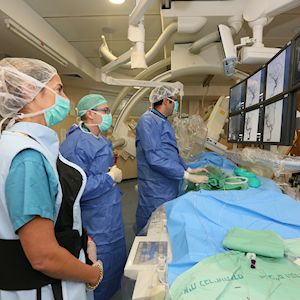Brain catheterization, may be a last resort for ischemic stroke patients. A rare operation, published only twice before, was performed at Rambam on a 78-year-old woman—brain catheterization twice within two days—in the same vein.
 A brain catheterization being performed
at Rambam Health Care Campus.
Photography: Pioter Fliter, RHCC
A brain catheterization being performed
at Rambam Health Care Campus.
Photography: Pioter Fliter, RHCC
Brain catheterization is one of the most complex and important medical skills. It may also be the last resort for ischemic stroke patients, where a blood vessel leading to the brain is blocked; a catheter can reach the source of the obstruction and treat it point-sensitive. In a rare operation described in the international medical literature only twice before, a 78-year-old woman from the Haifa area underwent this delicate procedure at Rambam Health Care Campus: twice within two days—in exactly the same vein.
The incident occurred recently, when “A” arrived at Rambam’s emergency room during the night, suffering from severe stroke symptoms. Following an examination via the hospital’s rapid diagnostic program, the elderly woman was rushed to the hospital’s Invasive Neuroradiology Unit. There, a brain catheterization was performed, while coping with other challenges resulting from her brain obstruction.
Despite the success of the first treatment, according to medical statistics, two percent of ischemic stroke patients who have undergone brain catheterization to treat the problem may experience another stroke within a short period of time. Indeed, while “A” was recovering from her first treatment at Rambam, she had another ischemic stroke two days later—in exactly the same place.
The medical team faced a dilemma: on the one hand, catheterization, which is an invasive procedure, could be a major source of trauma to the delicate blood vessels of the brain, when the procedure is repeated within such a short time. On the other hand, brain catheterization was still the best treatment possible for this patient.
Since “A” had almost completely recovered from the first event, it was decided to perform a CT scan to more accurately determine if the arteries could withstand a second treatment. The results revealed a rather positive condition for the short time span that had passed. And so the elderly woman was again brought into the catheterization room and underwent a second brain catheterization within 48 hours of the first one.
"Despite the difficult circumstances and the fact that she had experienced a second stroke within such a short period of time, the patient recovered quickly even after the additional catheterization," concludes Dr. Eitan Abergel, director of Rambam’s Invasive Neuroradiology Unit at Rambam and who performed the two catheterizations in “A.” "From a medical perspective, this situation is quite rare, so our coping with it like this was equally so. In the examination after the treatment, we are working with a lively and communicative woman who is able to speak and move her limbs.”
Only a few doctors in Israel can perform brain catheterizations
There are approximately 10,000 stroke cases each year in Israel, 15% of which are caused by bleeding in the brain (hemorrhage). However, 85% of the cases are due to an ischemic blockage. The window of opportunity to treat clotting in these cases is four and a half hours from the onset of the event—every passing minute is critical.
Brain catheterization widens that window to six hours or more by providing access to the blocked artery. In many cases, this procedure saves the lives of patients who have experienced a blockage to large blood vessels of the brain. There are currently 14 brain catheterization specialists in Israel. Two of them are at Rambam, Northern Israel’s largest medical center: Dr. Eitan Abergel and Dr. Rotem Sivan.

